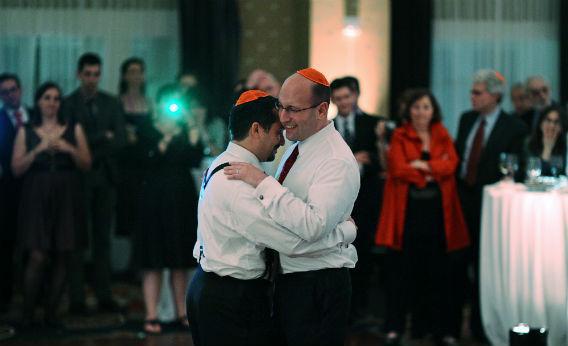Ross,
Reading your defense of the teaching against homosexual relationships brings me pain. Maybe I’m having some kind of Christian spiritual experience. But it feels much simpler: I’m watching an intelligent, compassionate writer torture his intellect and his values to fit a dogma that can no longer be justified by anything outside itself.
Your argument requires you to believe that God’s natural order inflicts on hundreds of millions of people a sexual orientation they can never consummate or solemnize in a way that would honor His purposes. That these people, regardless of sin, “cannot bear and rear [children] in accordance with … God’s original intention.” That Jesus demands celibacy of them, but not of you or me. That every marriage must be heterosexual — not to be virtuous or to benefit children, but to represent a “microcosm of humanity.” You even end up downplaying marriage. Now it’s you, not the sirens of the sexual revolution, proposing “alternative ways of life besides marriage.”
In the long run, I don’t think you or Christianity can withstand these contradictions. Fortunately, you’ve identified a way out: through an “intellectual or theological breakthrough,” “Christian moral doctrine could develop on this question without betraying the core of the faith.” Your book shows that this has happened before. Why is orthodoxy still around? In part, because it’s flexible. Unlike fundamentalism, orthodoxy is a driving brake, not a parking brake. It resists but also incorporates change.

Photograph by the Washington Post/Getty Images.
I’ll cite two examples. One is evolution. In Bad Religion, you outline the delicate process by which sophisticated Christians came to accept this theory despite what they read in Genesis. The key breakthrough (I’d call it a rationalization, but a believer might call it a revelation) was the concept of “limited inerrancy,” which ascribed truth not to the Bible’s exact language but, in your words, to what God, through that language, “intends to convey.”
The other example is civil rights. You point out that Christianity supplied the civil rights movement with a language of universal moral claims, and that black churches gave the movement its organizational power. You even tout Martin Luther King Jr., as a “neo-orthodox” figure. But you also admit that Southern clergymen opposed civil rights agitation, Pope Pius IX expressed solidarity with Jefferson Davis, and Billy Graham said only Christ’s return, not marches or politics, could end segregation. When I rearrange these facts and characterizations chronologically, it looks as though Christian orthodoxy assumed segregation and then, confronted by the moral and political tidal wave of civil rights, revised its doctrines to embrace the new order and its heroes.
Once orthodoxy is ready for a similar breakthrough on homosexuality, it will probably look, in retrospect, like the Catholic Church’s reconciliation with the separation of church and state. According to your account of that reconciliation, “What’s striking, looking back, is how Catholic the reforming midcentury intellectuals were—how confident they seemed in their own tradition’s intellectual resources, how naturally they framed their critiques of the present-day Church in light of the Catholic past … The Church’s own traditions, rather than the agenda of the secular world, were assumed to provide the natural patterns for reform.”
I look forward to the day when Christian writers explain how they found, in their faith’s past, the resources to see more clearly God’s intentions for mankind on the question of homosexuality. If this revelation happens in your lifetime, it might even make you feel good. And you know what? That’ll be OK.
Will